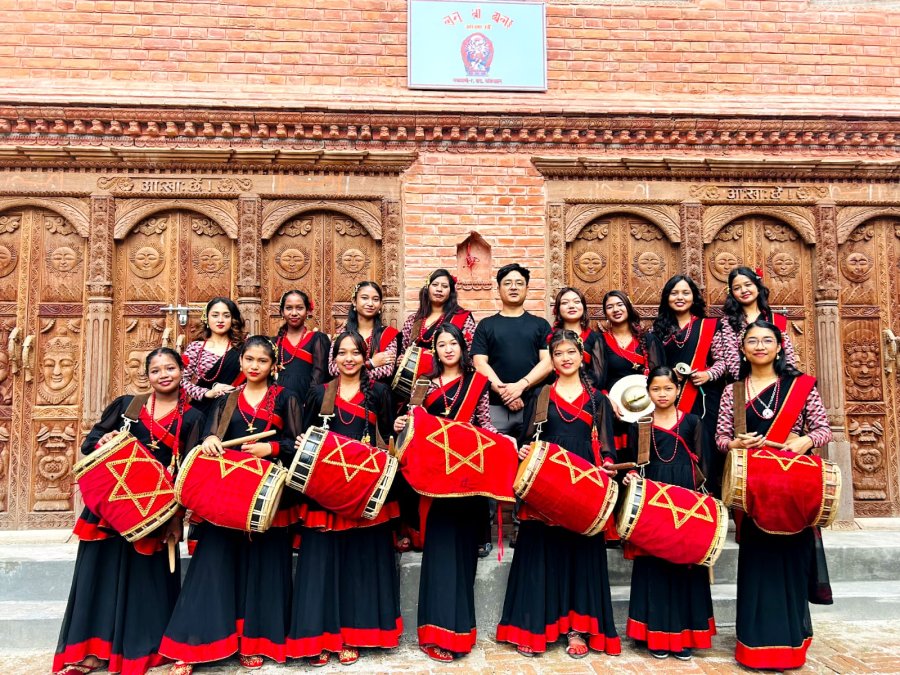November 25, 2024
KATHMANDU – Women and young girls, once excluded from the tradition of playing Newari musical instruments, are now taking the lead in preserving and revitalising the centuries-old Newari musical tradition.
One such example of change is the Lubhoo Dhaa Khala, which, according to its members, is the oldest Dhaa group in Lubhu of Lalitpur district. This group performs especially during jatras and other major Newari festivals.
The group now boasts a new batch of around 40 musicians, 20 of whom are women and girls. These individuals are mastering the percussive Dhaa and Khin, and the cymbals Tah and Bhusya, instruments historically reserved for men.
The group’s performances have now become a central part of local festivities, especially during the Gunla festival—a month-long celebration marking spiritual reflection and cultural devotion.
The musical instrument Dhaa is central to the festival’s observance. Known as the Gunla baja, the Dhaa is revered as the Buddha’s favourite instrument and is believed to bring good luck and prosperity when played around chaityas and temples.
“In the past, Newari instruments like the Dhaa were associated with male musicians, creating an exclusionary tradition,” says Bekh Narayan Shrestha, the head teacher of Lubhoo Dhaa Khala.
However, as social attitudes evolve, so do the practices surrounding these cultural symbols. Women are now claiming their rightful place in this heritage, learning and performing with great panache.
Bekh Narayan also says that while in the past playing this instrument was reserved for the higher Shrestha caste, today, caste is no longer a barrier—anyone can be a disciple.
Concerned about the traditional instruments nearing extinction, Bekh Narayan took the initiative in 2000 to establish a group and personally began teaching students.
While the Lubhoo Dhaa Khala began as a male-dominated group, its evolution into an inclusive space for women is an example of progress. Mandevi Shrestha, 38, who is Bekh Narayan’s daughter, is one beneficiary of the group’s outreach.
“I was always a rebel,” Mandevi says. “I put pressure on my father, who was the group’s teacher, to teach us girls as well. I told him, ‘If boys in my own home can learn to play it, why can’t I?”
Mandevi adds, “My persistence paid off, and in 2014, five women learners were included in the boys group.”
When some women who had joined in 2014 migrated after marriage, the number of women in the group dwindled. At the time, conservative societal attitudes discouraged many women from learning alongside men. Moreover, the women were often not given priority. This led to a temporary halt in teaching women.
However, over time, as more women expressed interest and the teachers faced pressure from within their own families—with their daughters and female relatives also wanting to play—by 2017 the group formally began recruiting all-female batches.
“When we first started, there was evident discrimination,” says Ashmita Pradhan, 23, who started learning the instrument in 2014 and has been teaching all-female batches since 2017. “Women were not seen as equals then. I’m glad to see things have improved. Nowadays, young girls join the group with full family support.”
The change is most evident in the current generation of musicians.
Prayusha Shrestha, an 11-year-old student at Future Star Academy in Lubhu, began learning Dhaa in 2023. “After school, I would rush to finish my homework and run to the training sessions,” she says. “I was always excited to learn.”
Another student, 20-year-old Sarishma Shrestha, adds, “From childhood, I listened to these instruments. But at the time, participation of girls wasn’t encouraged. When I finally got the chance last year, I was elated.”
The inclusion of women in Lubhoo Dhaa Khala has inspired a new generation of learners, some of whom are under 10 years old.

The inclusion of women in Lubhoo Dhaa Khala has inspired a new generation of learners. PHOTO: CONTRIBUTED/THE KATHMANDU POST
While others like Samira Shrestha (25), Neshana Shrestha (24), and Kriti Shrestha (23), have been playing since 2017. This trio belongs to the second batch of female learners, trained by Pradhan herself.
According to Samira, in the past, when they played during jatras, there were very few women involved. Despite the judgmental stares, they played with confidence.
“Today, the number of girls has increased significantly, and it’s great to see women and girls reclaim their space in preserving our culture, heritage, and music,” Samira says.
However, there are still hurdles.
According to Mandevi, some instruments, like the Khin, are still predominantly taught to men. “We’re advocating for change,” she says, “so that these traditions become fully inclusive.”
For teacher Bekh Narayan, preserving Newari music goes beyond gender inclusivity.
He emphasises the need for financial support to sustain the tradition. “Instruments are becoming more expensive,” he says. “We’ve introduced a donation box so even students can contribute, even if it’s just one rupee. We need support from the local government too.”
Currently, in the Khala, only the girls from Lubhu are part of the group. So they are now planning to include married daughters-in-law as well.
“This will help preserve our culture while empowering homemakers with Newari musicianship, ensuring the culture is passed down generations,” Bekh Narayan says.
The members of Lubhoo Dhaa Khala believe their efforts go beyond cultural preservation.
Sarishma notes that traditional instruments like the Dhaa enrich Nepal’s musical heritage. “They add diversity to the nation’s music scene, which is often overshadowed by modern and western influences,” she says.
In Lubhu, the beats of the Dhaa are no longer produced by just one gender or generation.
“Ten years ago, when there were few women, our dedication was often questioned,” Pradhan says. “Now, with more young girls joining, we feel empowered.”


